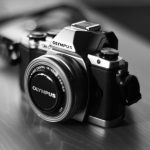The world of photography has come a long way since the days of film cameras. Today, digital cameras reign supreme, offering a wide range of features and capabilities that were once impossible. But for some photographers, the SLR (single-lens reflex) camera still holds a special appeal.
**What is an SLR Camera?**
An SLR camera is a type of camera that uses a mirror to reflect light from the lens up into a viewfinder. This allows the photographer to see exactly what the lens is seeing, making it easy to compose and focus the image. SLRs typically have interchangeable lenses, which gives the photographer the flexibility to use different lenses for different types of photography.
**What is a Digital Camera?**
A digital camera is a camera that uses an electronic sensor to capture images. The sensor converts light into electrical signals, which are then processed by the camera's computer to create an image file. Digital cameras are typically smaller and lighter than SLRs, and they offer a number of features that SLRs do not, such as the ability to record video and store images on a memory card.
**SLR vs. Digital Camera: Which One is Right for You?**
The best way to decide which type of camera is right for you is to consider your photography needs. If you are a serious photographer who needs a camera that offers high-quality images and interchangeable lenses, then an SLR camera may be a good choice. However, if you are a casual photographer who is looking for a camera that is easy to use and portable, then a digital camera may be a better option.
**Advantages of SLR Cameras**
* **High-quality images:** SLR cameras typically have larger sensors than digital cameras, which results in higher-quality images.
* **Interchangeable lenses:** SLR cameras allow you to change lenses, which gives you the flexibility to use different lenses for different types of photography.
* **Optical viewfinder:** SLR cameras have an optical viewfinder, which allows you to see exactly what the lens is seeing. This makes it easy to compose and focus the image.
* **Manual controls:** SLR cameras offer manual controls, which give you more creative control over your images.
**Disadvantages of SLR Cameras**
* **Larger and heavier:** SLR cameras are typically larger and heavier than digital cameras.
* **More expensive:** SLR cameras can be more expensive than digital cameras.
* **More complex to use:** SLR cameras can be more complex to use than digital cameras, especially for beginners.
**Advantages of Digital Cameras**
* **Smaller and lighter:** Digital cameras are typically smaller and lighter than SLR cameras.
* **Less expensive:** Digital cameras are typically less expensive than SLR cameras.
* **Easier to use:** Digital cameras are typically easier to use than SLR cameras, especially for beginners.
* **More features:** Digital cameras offer a number of features that SLRs do not, such as the ability to record video and store images on a memory card.
**Disadvantages of Digital Cameras**
* **Lower-quality images:** Digital cameras typically have smaller sensors than SLR cameras, which results in lower-quality images.
* **No interchangeable lenses:** Most digital cameras do not allow you to change lenses.
* **Electronic viewfinder:** Digital cameras have an electronic viewfinder, which can be less accurate than an optical viewfinder.
* **Less creative control:** Digital cameras typically offer less creative control than SLR cameras.
**Conclusion**
Ultimately, the best way to decide which type of camera is right for you is to consider your photography needs. If you are a serious photographer who needs a camera that offers high-quality images and interchangeable lenses, then an SLR camera may be a good choice. However, if you are a casual photographer who is looking for a camera that is easy to use and portable, then a digital camera may be a better option.

